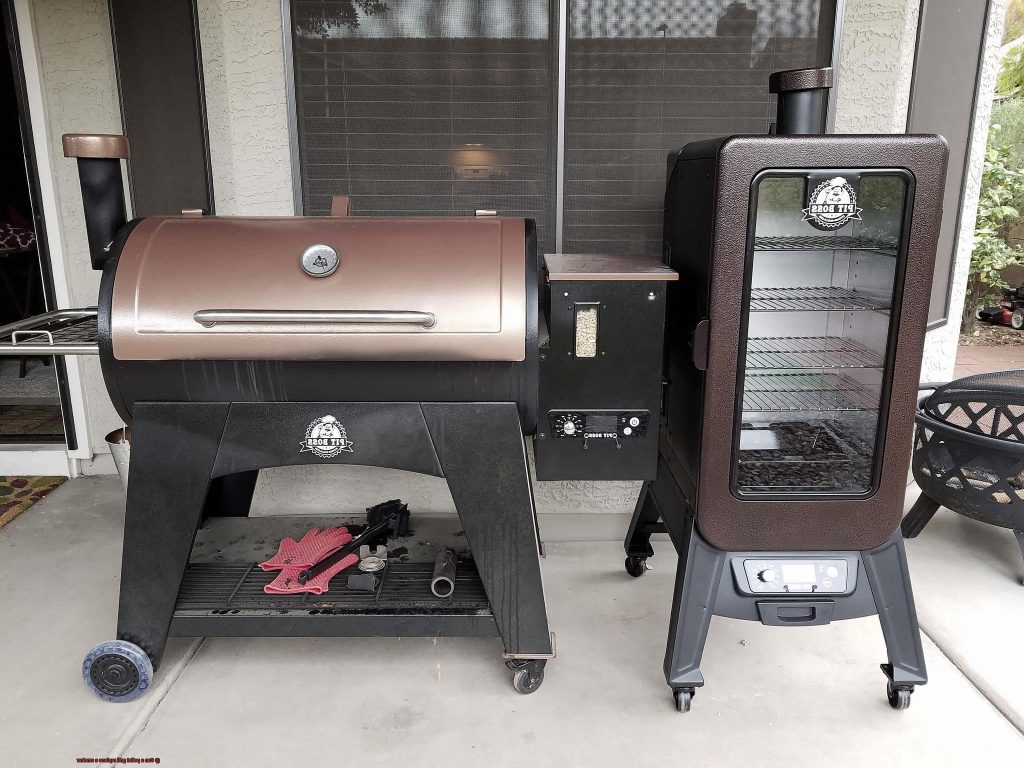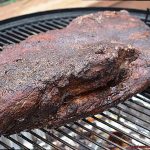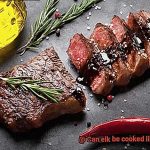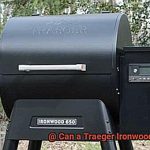Are you a passionate outdoor cooking enthusiast? Have you ever considered adding a smoker to your grilling arsenal, but found it hard to decide if a pellet grill can replace it? Well, the answer isn’t straightforward. It all boils down to personal preference and the kind of cooking experience you’re after.
Traditional wood or charcoal smokers are known for their superior flavor and texture of meat. On the other hand, pellet grills offer convenience and ease of use with precise temperature control and automated pellet feeding systems.
But why choose between the two when you can have both? Many pellet grills can double as smokers, allowing you to enjoy the best of both worlds. With the right accessories and techniques, you can achieve that classic smoky flavor and slow-cooked texture on a pellet grill.
Whether you’re looking to replace your smoker or expand your outdoor cooking options, finding the best equipment that fits your needs is crucial. So let’s dive deeper into the differences between pellet grills and smokers and explore the possibilities of each one.
Contents
Advantages of Using a Pellet Grill
If you’re seeking a grilling experience that is both versatile and easy to use, a pellet grill just might be the perfect choice for you. Pellet grills have been gaining popularity in recent years, and for a good reason. They offer several benefits over traditional smokers, making them an attractive option for both beginners and experienced grillers.
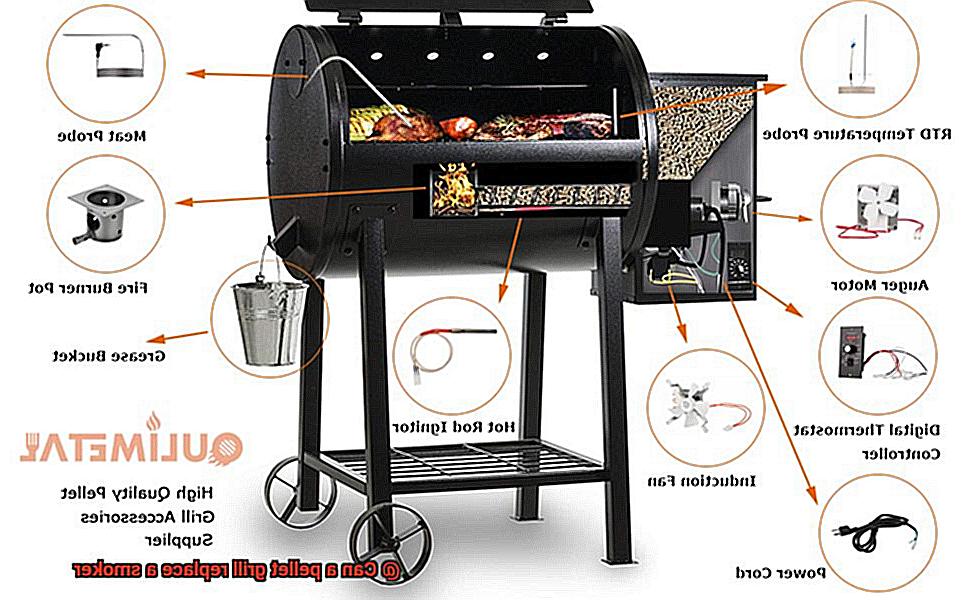
Firstly, pellet grills offer consistent temperature control. With digital controllers that allow you to set the temperature precisely and maintain it throughout the cooking process, you can achieve perfect results every time without the need for constant monitoring and adjustments. You’ll never have to worry about your food being overcooked or undercooked again.
Secondly, pellet grills are incredibly versatile. You can use them for a wide range of cooking methods, from smoking to grilling, roasting, baking, and even braising. This versatility makes them an excellent choice for those who want to experiment with different cooking techniques without having to invest in multiple devices.
Thirdly, pellet grills are easy to use. Unlike traditional smokers that require a lot of attention and maintenance, pellet grills are simple to operate. All you need to do is load the hopper with pellets, set the temperature, and let the grill do the rest. This means you can spend more time enjoying your food and less time fussing over the grill.
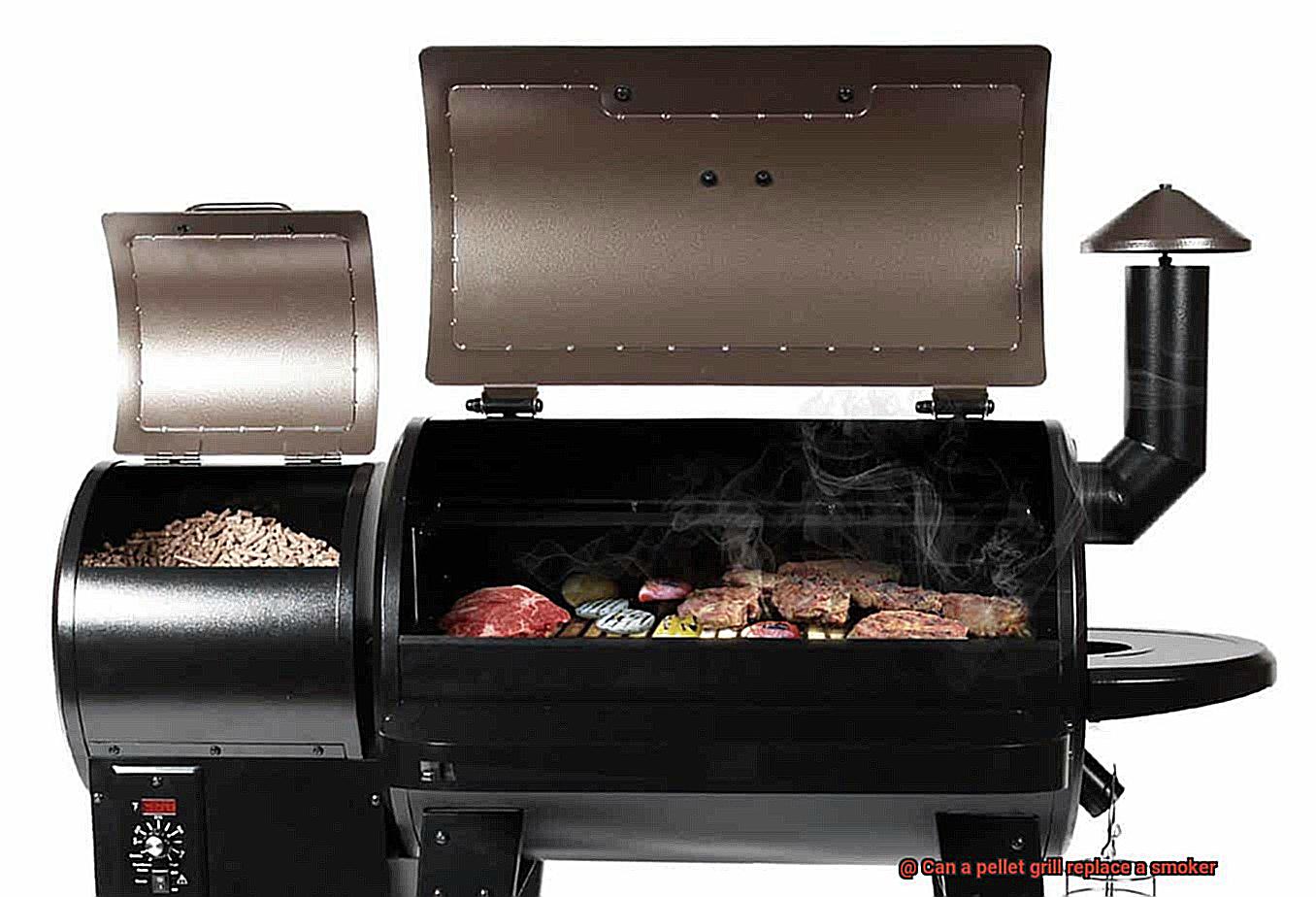
Fourthly, pellet grills are fuel-efficient. Pellets burn cleanly and efficiently, producing very little ash and requiring less fuel than traditional smokers. This means that you can cook for longer periods without having to refill the hopper or worry about running out of fuel. Plus, pellets are widely available and come in a variety of flavors to enhance the taste of your food.
Finally, pellet grills offer a unique smoky flavor that is hard to replicate with other cooking methods. The pellets used in these grills are made from compressed sawdust, which produces a clean and consistent burn that infuses your food with delicious smoky flavor. You’ll have a hard time finding a better way to get that perfect smoky flavor in your food.
Disadvantages of Using a Pellet Grill
While pellet grills offer convenience and versatility, there are some potential disadvantages that should be considered before making the switch.
One major factor to keep in mind is cost. Pellet grills can be pricier than traditional smokers due to their advanced technology. Plus, you’ll need to purchase pellets regularly to keep your grill running, adding to the ongoing expense.
Another disadvantage is the potential lack of smoke flavor. Some argue that pellet grills don’t produce the same robust and authentic smoke flavor as traditional smokers. While they do provide a smoky taste, it may not be quite what you’re used to.
Furthermore, pellet grills may not reach as high temperatures as traditional smokers, which can impact cooking times and results. Even though they can reach high temperatures, maintaining them consistently throughout the cooking process can be challenging.
Finally, if you enjoy the hands-on experience of smoking meats, a pellet grill might not be for you. Part of the joy of smoking is stoking the fire and monitoring the temperature yourself. A pellet grill takes some of the work out of smoking, which may not be desirable for everyone.
How to Choose the Right Pellet Grill for Your Needs
If you’re in the market for a new grill, pellet grills offer a versatile and efficient option for wood-fired flavor. But with so many options out there, it can be challenging to choose the right one. Here are five sub-sections to consider when choosing the perfect pellet grill for your needs.
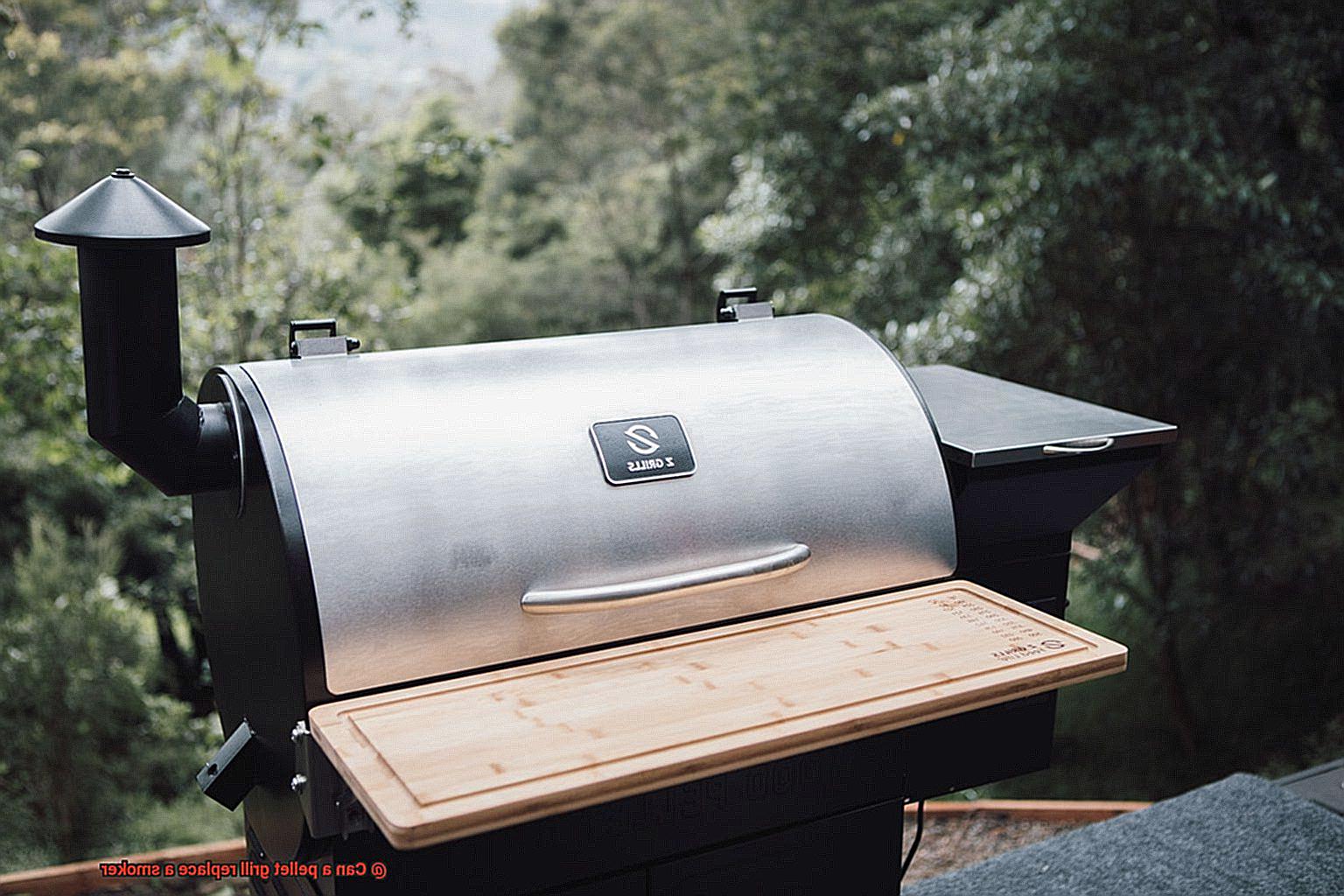
Determine Your Budget
Before you start shopping, it’s crucial to determine how much you’re willing to spend on a pellet grill. Prices can range from a few hundred dollars to several thousand dollars depending on size and features. By setting a budget, you can narrow down your options and avoid overspending.
Consider the Size of the Grill
Pellet grills come in various sizes, so it’s important to choose one that suits your needs. If you frequently entertain large groups, opt for a larger grill with more cooking space. On the other hand, if you’re only cooking for yourself or a small family, a smaller grill might suffice.
Temperature Range and Control
Different pellet grills offer different temperature ranges and control features. If you plan on cooking a variety of foods that require different temperatures, look for a model with a wider temperature range. Additionally, some models offer advanced temperature control features such as Wi-Fi connectivity and meat probes for precise cooking.
Quality Construction
To ensure your pellet grill lasts for years to come, choose one made from high-quality materials such as stainless steel or cast iron. These materials can withstand the elements and last longer than cheaper options.
Additional Features
Consider any additional features that may be important to you, such as searing capabilities, side shelves, built-in thermometers, or ash cleanout systems. While these features may increase the overall cost of the grill, they can also make it more versatile and user-friendly.
The Benefits of Smoking Meat with a Smoker
Smoking meat with a smoker has been perfected by barbecue enthusiasts, resulting in delicious and tender meat that is sure to impress.
The first benefit of smoking meat with a smoker is the incredible flavor it provides. The slow cooking process allows the meat to absorb the smoky essence, resulting in an explosion of rich and savory flavor. Using different types of wood chips or chunks such as hickory, mesquite, or applewood adds unique and delicious flavors to your meat that cannot be achieved through other cooking methods.
But there’s more to smoking meat with a smoker than just flavor. It also allows for greater control over the temperature and cooking process, making it easier to cook your meat evenly throughout. Unlike grilling, which can be challenging to control, smoking gives you precise temperature regulation ensuring consistent results every time. Additionally, the slow cooking process helps to break down tough cuts of meat, making them more tender and flavorful.
For those who are health-conscious, smoking meat with a smoker can be a healthier option than other cooking methods. The lower temperatures and extended cooking time help retain more natural juices and nutrients in the meat, resulting in a healthier and more flavorful meal. Plus, the slow cooking process allows for excess fat to drip off, resulting in leaner meats.
Finally, smoking meat with a smoker is a fun and enjoyable experience for both novice and experienced cooks alike. Experimenting with different types of wood and spices can lead to unique and delicious flavor combinations that will impress guests at your next barbecue. Plus, there’s nothing quite like the satisfaction of serving up a perfectly smoked brisket or rack of ribs to friends and family.
The Drawbacks of Smoking Meat with a Smoker
While smoking meat with a traditional smoker is a beloved method for achieving mouth-watering meals, it’s important to consider the drawbacks before firing up your smoker. As an expert on this topic, I’ve done my research and compiled some essential points for you to consider.
Firstly, smoking meat is a time-consuming and labor-intensive process that requires constant monitoring of the temperature and smoke levels throughout the cooking process. This can be particularly challenging for beginners, who may struggle to get the timing and temperature just right. Overcooking or undercooking can lead to disappointing results.
In addition to the practical concerns, traditional smokers can also be cumbersome due to their size and weight. They can take up a lot of space, making them difficult to store or transport. This can be a significant issue for those who live in smaller homes or apartments or like to take their cooking equipment on the go.
Lastly, there are health risks associated with smoking meat. When meat is smoked, it is exposed to high temperatures and harmful chemicals from the smoke, which can increase the risk of certain types of cancer. While these risks can be minimized by using high-quality wood chips and limiting cooking times, they are still a concern for many people.
Despite these drawbacks, traditional smokers are still popular for their ability to produce delicious, flavorful meat. However, it’s worth considering other options as well – such as pellet grills – which offer the same smoky flavor but with fewer drawbacks.
Comparing the Flavor Output from a Pellet Grill vs. a Smoker
While both methods have their pros and cons, it’s important to understand the differences in flavor output between the two.
Let’s start with the traditional smoker. These devices rely on wood or charcoal to create smoke and infuse flavor into the meat. One of the biggest advantages of using a smoker is the ability to customize the type of wood used for smoking. Different woods can create a range of flavors – from hickory’s strong, smoky taste to fruitwoods like apple or cherry for a more subtle sweetness. The result is a complex and authentic smoky flavor that some barbecue enthusiasts swear by.
But what if you’re looking for a more convenient option? Enter the pellet grill. These grills use compressed wood pellets that are fed into a hopper and burned in a controlled manner to produce heat and smoke. Pellet grills often come with built-in temperature controls and timers that allow for precise cooking and smoking times. Additionally, many pellet grills offer the option to add wood chips or chunks for additional flavor customization. The result is a consistent, easy-to-use method for achieving a smoky flavor.
So which one is better? It ultimately depends on your individual preferences and cooking style. Some argue that traditional smokers provide a more authentic and complex smoky flavor, while others prefer the convenience and consistency of using a pellet grill. But why choose? Experiment with both methods to determine which option works best for your particular needs.
Temperature Control with Pellet Grills vs. Smokers
Pellet grills and smokers both offer temperature control features, but they differ in their mechanisms and capabilities. In this post, we’ll take a closer look at the differences between temperature control with pellet grills and smokers.
Pellet grills use an electronic controller that allows users to set the desired temperature, which the grill then maintains by feeding wood pellets into the fire pit. This feature makes pellet grills incredibly easy to use, especially for beginners who may struggle with manually maintaining consistent temperatures. This feature also provides consistent heat control throughout the cooking process, ensuring that the food is cooked evenly.
On the other hand, smokers rely on manual temperature control methods such as adjusting dampers, airflow, and adding wood or charcoal to maintain the desired temperature. While this may require more attention and experience than using a pellet grill’s electronic controller, experienced users can adjust their smoker’s dampers and airflow to maintain a steady temperature throughout the cooking process. This can result in a more nuanced and flavorful final product.
It’s also essential to consider the temperature range of each device. Pellet grills typically have a temperature range of 160-500 degrees Fahrenheit, while smokers can reach up to 600 degrees Fahrenheit. This means that pellet grills are better suited for low-and-slow cooking methods like smoking, while smokers are better suited for high-temperature cooking methods like searing and grilling.
Cost Comparison between Pellet Grills and Smokers
When it comes to choosing between a pellet grill and a traditional smoker, one of the most important factors to consider is cost. As an expert on this topic, I can tell you that while pellet grills tend to have a higher upfront cost, they offer many benefits that make them well worth the investment in the long run.
Firstly, let’s talk numbers. Pellet grills typically range from $500-$1,500, whereas traditional smokers can be found for as little as $100. However, it’s important to consider the long-term costs associated with each option.
Pellet grills use wood pellets as fuel, which may seem more expensive than traditional charcoal or wood chips at first. However, they are also more efficient and produce less waste, meaning you will need to buy fewer pellets overall. Additionally, many pellet grills come with built-in temperature controls and other features that can save you money on accessories and additional equipment.
In contrast, traditional smokers require more attention and maintenance than pellet grills. They often require the use of additional equipment such as thermometers and ash buckets, which can add up quickly in terms of cost.
It is also worth noting that pellet grills offer greater versatility than traditional smokers. You can use them for grilling, smoking, roasting, baking and even braising. This means you can eliminate the need for multiple pieces of equipment and save money in the long run.
Overall, the cost comparison between pellet grills and smokers ultimately depends on your individual needs and preferences. If you want consistent results with minimal effort and maintenance, a pellet grill may be worth the investment. However, if you’re on a tight budget and don’t mind putting in some extra work, a traditional smoker may be the way to go.
EJqllBPDM18″ >
Conclusion
In the end, whether a pellet grill can replace a smoker or not is a matter of personal taste and cooking style. While smokers are renowned for their exceptional meat flavor and texture, pellet grills offer convenience and ease of use with features like precise temperature control and automated pellet feeding systems. The good news is that many pellet grills can double as smokers, giving you the best of both worlds.
Pellet grills have several advantages over traditional smokers, such as consistent temperature control, versatility, fuel efficiency, ease of use, and unique smoky flavor. However, traditional smokers offer an authentic smoky flavor that some barbecue enthusiasts swear by but require more attention and maintenance.
When selecting between a pellet grill and a smoker, it’s crucial to consider factors like budget, grill size, temperature range and control features, quality construction materials used in making the grill or smoker. Other features that may be relevant to you include searing capabilities, side shelves, built-in thermometers or ash cleanout systems.
Ultimately both options have their pros and cons. The choice depends on your individual preferences and cooking needs. Whether you prefer the classic smoky taste of a traditional smoker or the convenience of a pellet grill with its unique smoky flavor is entirely up to you.

